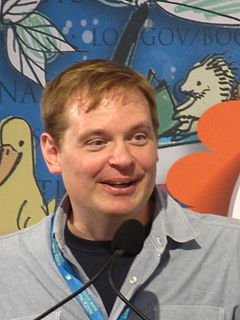A Quote by Alan Lightman
But what is the past? Could it be, the firmness of the past is just illusion? Could the past be a kaleidoscope, a pattern of images that shift with each disturbance of a sudden breeze, a laugh, a thought? And if the shift is everywhere, how would we know?
Related Quotes
It is not the literal past that rules us, save, possibly, in a biological sense. It is images of the past. Each new historical era mirrors itself in the picture and active mythology of its past or of a past borrowed from other cultures. It tests its sense of identity, of regress or new achievement against that past.
What would happen if history could be rewritten as casually as erasing a blackboard? Our past would be like the shifting sands at the seashore, constantly blown this way or that by the slightest breeze. History would be constantly changing every time someone spun the dial of a time machine and blundered his or her way into the past. History, as we know it, would be impossible. It would cease to exist.
We learn in the past, but we are not the result of that. We suffered in the past, loved in the past, cried and laughed in the past, but that's of no use to the present. The present has its challenges, its good and bad side. We can neither blame nor be grateful to the past for what is happening now. Each new experience of love has nothing whatsoever to do with past experiences. It's always new.
An important part of building a new culture was allowing people to complain about their past. At first, the more they complained, the worse the past would seem. But by venting, people could start to resolve the past. By bitching and bitching and bitching, they could exhaust the drama of their own horror stories. Grow bored. Only then could they accept a new story for their lives. Move forward.
what he sought was always something lying ahead, and even if it was a matter of the past it was a past that changed gradually as he advanced on his journey, because the traveller's past changes according to the route he has followed: not the immediate past, that is, to which each day that goes by adds a day, but the more remote past. Arriving at each new city, the traveller finds again a past of his that he did not know he had: the foreignness of what you no longer are or no longer possess lies in wait for you in foreign, unpossessed places.
We do have the ability to shift our paradigms - by shifting our belief systems, by working on ourselves, by looking very closely at how we show up in the world. It's why I'm into health and wellness. It's why my partner and I are very focused on creating a life that is about being connected; it's about being present. Because my life was probably so much in the past. I was so fearful. I was so fearful of the future because I was so scared of my past. So if you can work towards being present, then you can shift.
But the past does not exist independently from the present. Indeed, the past is only past because there is a present, just as I can point to something over there only because I am here. But nothing is inherently over there or here. In that sense, the past has no content. The past - or more accurately, pastness - is a position. Thus, in no way can we identify the past as past
What has happened is that we have seen a shift in the past twenty years in the very concept of hacking. So hacking twenty years ago was a neutral, positive concept. Somebody who was a hacker was someone with advanced computer skills, which could expose vulnerabilities and could explain why systems worked well or worked badly and they were generally regarded as an asset. Over the past twenty years, a combination of media and law enforcement has changed the perception of the concept so that it has almost always, if not invariably, a pejorative sense attached.



































